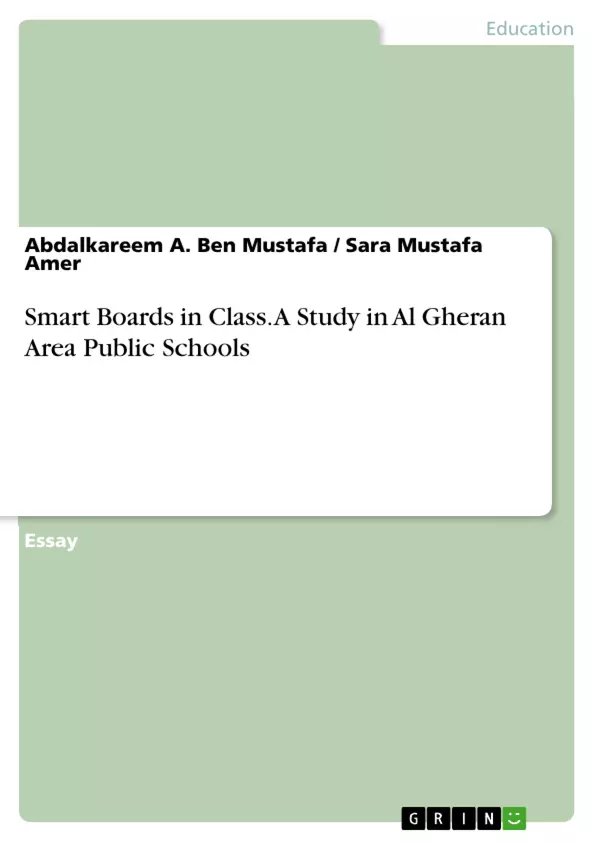The study aims to explore the reality of the use of the smart board (SB) for teaching in Al Gheran area public schools, in Misrata. At the same time the goal is to show the most important features of the SB, and recognize the most prominent obstacles faced by teachers in schools with SB. The study adopts a quantitative research approach characterized by a questionnaire including 14 items. Forty teachers of primary and preparatory school responded to these questionnaire items. The data were analyzed by SPSS version 20, and then provides a set of recommendations and proposals to activate the use of the SB for teaching in Libyan public schools.
The SB is an effective way of teaching, and it attracts the students by writing electronically in all colors and sizes using writing tools on the SB program instead of writing with crayons and markers. Saving time and effort for the teacher, the SB saves a lot of effort and provides teachers with what they need as a science teacher for the figures and pictures, and the teacher of geography needs for maps as the English teacher needs a number of cards and pictures to display words.
Inhaltsverzeichnis (Table of Contents)
- Abstract
- Modern Technology in the Educational Process
- Blackboard as a Teaching Tool
- Interactive Whiteboard (IWB) or SB
- The SB is a Powerful Teaching Tool for Classrooms
- The Importance of the SB in the Educational Process
- The Smart-board Influences the Learning Process
- Show Lessons in an Interesting Way
- Recording and Replay of Lessons
- Solving the Shortage of Teachers
- Means to Teach People with Special Needs
- Makes Learning More Flexible
- Literature Review
- The Importance of Research
Zielsetzung und Themenschwerpunkte (Objectives and Key Themes)
This study investigates the actual use of smart boards (SB) in public schools in Al Gheran, Misrata. It aims to identify the key features of SBs and the main challenges teachers face when using them in classrooms. The research utilizes a quantitative approach through a questionnaire distributed to 40 primary and preparatory school teachers. The study analyzes the collected data to provide recommendations for enhancing the use of SBs in Libyan public schools.
- The use and implementation of smart boards in Libyan public schools.
- The perceived advantages and limitations of using smart boards in the classroom.
- The impact of smart boards on student engagement and learning outcomes.
- The role of teacher training and support in facilitating the successful integration of smart boards into the teaching process.
- Recommendations for promoting the use of smart boards and addressing challenges in Libyan public schools.
Zusammenfassung der Kapitel (Chapter Summaries)
- Abstract: The study outlines its objectives, methodology, and key findings related to the use of smart boards (SB) in Al Gheran public schools, Misrata. It highlights the research approach, data collection methods, and the expected outcomes of the study.
- Modern Technology in the Educational Process: This chapter discusses the evolution of teaching tools, from the traditional blackboard to the modern interactive whiteboard (IWB) or smart board (SB). It emphasizes the transformative potential of SB technology and its role in revolutionizing the teaching and learning process.
- The SB is a Powerful Teaching Tool for Classrooms: This section delves into the functionalities and capabilities of the SB, highlighting its touch-screen interface, digital projection capabilities, and interactive features. It describes how teachers and students can utilize the SB for writing, highlighting, and engaging with digital content, emphasizing its advantages for interactive and collaborative learning.
- The Importance of the SB in the Educational Process: This section explores the various benefits of integrating SBs into the educational process. It discusses how SBs can enhance student engagement, facilitate teacher planning and presentation, and promote interactive learning. It also emphasizes the role of SBs in recording and replaying lessons, addressing teacher shortages, and catering to students with special needs.
- Literature Review: This chapter reviews existing research on the use of SBs in classrooms, highlighting the positive impacts observed in terms of student engagement, motivation, and learning outcomes. It also discusses the challenges associated with integrating technology into classrooms and the importance of providing teachers with adequate training and support.
Schlüsselwörter (Keywords)
The primary keywords and themes of this research include smart boards (SB), interactive whiteboards (IWB), educational technology, teaching methods, student engagement, teacher training, and educational innovation in Libyan public schools.
Frequently Asked Questions
What are the benefits of using Smart Boards (SB) in classrooms?
Smart Boards attract students through interactive content, save teacher effort by providing digital resources like maps and figures, and allow for lesson recording.
What obstacles do teachers face with Smart Boards in Libya?
Key challenges include a lack of technical training, insufficient support, and the need for better integration into the daily teaching process.
How does an Interactive Whiteboard (IWB) influence student engagement?
By allowing students to interact with digital content using touch and various colors, it makes learning more flexible and interesting compared to traditional blackboards.
Can Smart Boards help students with special needs?
Yes, the study identifies SBs as a powerful tool for catering to diverse learning styles and supporting students with special educational needs.
What was the methodology of the study in Al Gheran?
The research used a quantitative approach with a 14-item questionnaire distributed to 40 primary and preparatory school teachers, analyzed via SPSS.
- Quote paper
- Abdalkareem A. Ben Mustafa (Author), Sara Mustafa Amer (Author), 2018, Smart Boards in Class. A Study in Al Gheran Area Public Schools, Munich, GRIN Verlag, https://www.grin.com/document/412775



